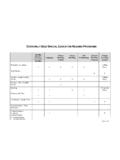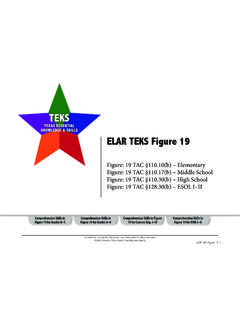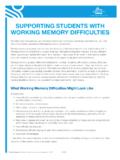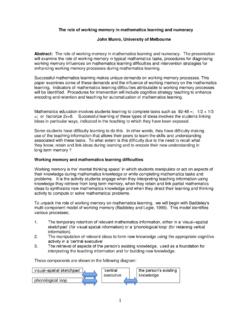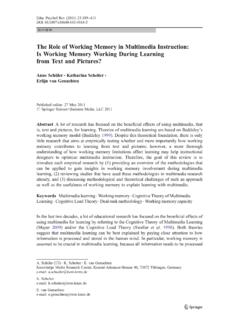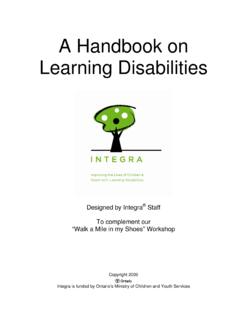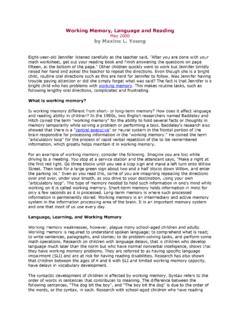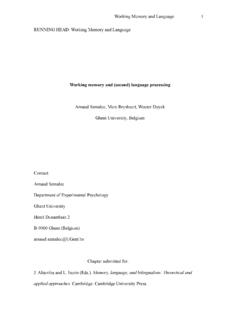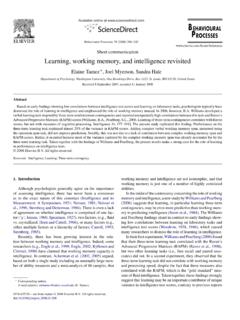Transcription of Areas of Processing Deficit and Their Link to Areas of ...
1 Areas of Processing Deficit and Their link to Areas of Academic Achievement Phonological Processing Model Wagner, , Torgesen, , & Rashotte, (1999). Comprehensive Test of Phonological Processing . Austin, TX: PRO-ED; Wagner, , Torgesen, , & Rashotte, (1994). Development of reading-related phonological Processing abilities: New evidence of bi-directional causality from a latent variable longitudinal study. Developmental Psychology, 30, 73-87; Wagner, , & Torgesen, (1987). The nature of phonological Processing and its causal role in the acquisition of reading skills.
2 Psychological Bulletin, 101, 192-212. Overview The past decade has witnessed a profound advancement in the understanding of phonological Processing the kind of auditory Processing that is most strongly related to mastery of written language (reading and writing), and is clearly implicated as the most common cause of reading disabilities. Phonological awareness, phonological memory , and rapid naming represent three correlated, yet distinct kinds of phonological Processing abilities. Deficits in phonological awareness, phonological memory , and/or rapid naming are common in children with reading disabilities.
3 These deficits appear to be the root of many decoding difficulties faced by individuals with reading disabilities. Definition of Phonological Core Deficit Phonological core deficits entail difficulties making use of phonological information when Processing written or oral language. The major components of phonological deficits involve phonemic awareness (one s understanding of and access to the sound structure of language), sound-symbol relationships, and storage and retrieval of phonological information in memory . Three Kind of Phonological Processing Phonological Awareness: Phonological awareness refers to an individual s awareness of and access to the sound structure of his/her oral language.
4 This awareness proceeds from word length phonological units in compound words ( , cowboy), to syllables within words, to onset-rimes units within syllables to individual phonemes within rimes, and finally to individual phonemes within consonant clusters. Phonological memory : Phonological memory refers to coding information phonologically for temporary storage in working memory . A deficient phonological memory does not appear to impair either reading or listening to a noticeable extent, provided the words involved are already in the individual s vocabulary. However, phonological memory impairments can constrain the ability to learn new written or spoken vocabulary.
5 Rapid Naming: Rapid naming of objects, colors, digits, or letters requires efficient retrieval of phonological information from long-term memory . The efficiency with which individuals are able to retrieve phonological codes associated with individual phonemes, word segments, or entire words should influence the degree to which phonological information is useful in decoding printed words. Measures of rapid naming require speed and Processing of visual as well as phonological information. The skills involved include efficient retrieval of phonological information from long-term memory and executing a sequence of operations quickly and repeatedly.
6 Double Deficit Hypothesis: It has been hypothesized that individuals who have double deficits that is, deficits in both rapid naming and phonological awareness appear to have greater difficulties learning to read than do individuals with deficits in either rapid naming or phonological awareness alone. link to Achievement Reading: Deficits in phonological awareness are viewed as the hallmark of basic word reading disabilities. It is, however, the most responsive to intervention of the phonological Processing skill Areas . Phonological awareness skills should proceed from sensitivity to same verses, different or phonological segments, to an ability to identify and count phonological segments, to an ability to manipulate phonological segments.
7 Storage of phonological information during reading involves creating a sound-based representation of written words in working memory . Deficits in storage of phonological information result in faulty representations in memory , which lead to inaccurate application of sound rules during reading tasks. A Deficit in phonological memory does not inevitably lead to poor reading of familiar material, but is more likely to impair decoding of new words, particularly words that are long enough to decode bit by bit as a means of storing intermediate sounds. A Deficit in phonological memory may impair reading comprehension for more complex sentences.
8 Naming facility or rapid automatic naming is very important to reading achievement. Retrieval of phonological information from long-term memory refers to how the child remembers pronunciations of letters, word segments, or entire words. Reading disabled children may have difficulty in this area, which leads to slow and inaccurate recall of phonological codes from memory . Efficient retrieval of phonological information and execution of sequences of operations are required when readers attempt to decode unfamiliar words. Deficits in this area often result in difficulties with reading fluency. Math: Some literature suggests that phonological deficits may be related to math disabilities.
9 Phonological Processing problems have been associated with difficulties memorizing basic math facts. The research, however, is not conclusive. Written Expression: Phonological awareness provides students with an important tool for understanding the link between written and spoken language. Phonological memory impairments can constrain the ability to learn new written vocabulary. Oral Language: Phonological memory impairments can constrain the ability to learn new oral vocabulary. It is likely to impair listening comprehension for complex sentences. Carroll-Horn Cattell (CHC) Theory of Cognitive Processing The following information was adapted from: Flanagan, D.
10 P., Ortiz, S. O., Alfonso, V. C. & Mascolo (2002). The Achievement Test Desk Reference: Comprehensive Assessment and Learning Disabilities. Boston: Allyn & Flanagan, D. P., & Ortiz, S. O. (2001). Essentials of the cross battery approach. New York: Flanagan, D. P., McGrew, & Ortiz, S. O. (2000). The Weschler intelligence scale s and Gf-Gc theory: A contemporary approach to interpretation. Boston: Allyn & Bacon. Fluid Reasoning Technical Definition Fluid reasoning is the ability to use and engage in various mental operations when faced with a relatively novel task that cannot be performed automatically.

